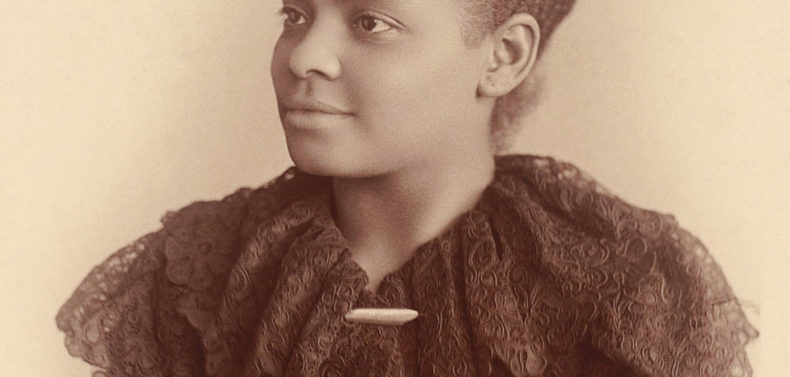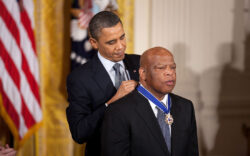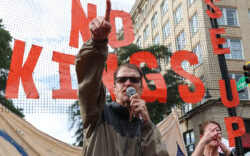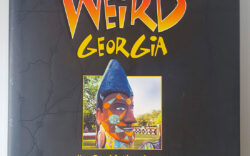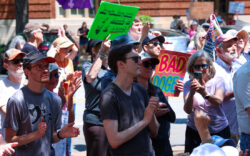Speaking at Mount Rushmore in South Dakota on July 3, President Donald J. Trump seemed small indeed beneath the granite gazes of George Washington, Thomas Jefferson, Abraham Lincoln and Theodore Roosevelt carved into the face of a mountain on land that was sacred to Native Americans before it was stolen by white men in the 19th Century. Trump used the occasion to lambast the left and call for the creation of a National Garden of American Heroes, what he called “a vast outdoor park that will feature the statues of the greatest Americans to ever live.”
The proposed statue garden would include 31 statues, including inventors like the Wright Brothers, civil rights leaders Martin Luther King Jr. and Frederick Douglass, soldiers Audie Murphy and George Patton, and right-wing icons President Ronald Reagan and Justice Antonin Scalia. One does not have to look too far to come up with worthy Americans who were heroic in their times and are deserving of commemoration today.
While Trump and his supporters waved the flag and fireworks exploded over Mount Rushmore, one had to wonder how many of them know that this nation’s Pledge of Allegiance was written by a socialist. Francis Bellamy (1855–1931) was a writer and a Christian minister who once preached a sermon titled “Jesus the Socialist.” He penned the pledge for a children’s magazine in 1892, the 400th anniversary of the voyage of Christopher Columbus. Though he was a minister, his original pledge did not include the phrase “under God” because Bellamy believed in a country of inclusiveness for all citizens of every creed. “Under God” was tacked onto his pledge during the repressive McCarthy era of the 1950s.
Albert Parsons (1848–87) was a labor leader and anarchist orator who was hanged in Chicago in 1887 after the infamous Haymarket Riot. A Southerner who served in the Confederate Army during the Civil War, Parsons came to view the conflict as “the slave-holders rebellion.” Parsons was scorned in his native South after the war because of his radical views and for his interracial marriage to Lucy Parsons, a woman of African-American and Hispanic descent. The couple worked for better wages and working conditions for laborers during the “Gilded Age” of plutocrats against the poor. They took prescient stands against child labor and police misconduct. The couple deserves to be honored as what John Lennon called “working class heroes.”
Marine Gen. Smedley Butler (1881–1940) was a two-time Medal of Honor recipient who at the time of his death was the most decorated Marine in U.S. history. He became a leading antiwar voice who famously said, “War is a racket,” and fumed that he was used as “a hit man for big business” during his military career. He stood against the Businessmen’s Plot of the 1930s that sought to remove President Franklin Roosevelt in a military/corporate coup d’etat.
Alice Paul (1885–1977) endured prison for her tireless work for women’s right to vote. She was a leader of the Woman Suffrage Procession that upstaged the inauguration of President Woodrow Wilson in 1913, when thousands of suffragists filled the streets of the nation’s capital.
Ida B. Wells (1862–1931) was a writer and a civil rights advocate whose journalism exposed the horrors of lynching in the Jim Crow South. An African-American woman who called on this nation’s Black people to arm themselves as protection against white supremacy, she also defied the more genteel segregation of the 1913 women’s suffrage march in Washington by linking hands and marching with white women in the parade.
Rosa Parks (1913–2005) earned her nickname as “the Mother of the Movement” for civil rights when she took a stand for justice by sitting down in the “whites only” section of a city bus in Alabama in 1955. Her act of defiance led to the Montgomery Bus Boycott that catapulted a young minister named Martin Luther King Jr. into the national spotlight. Parks was a black woman who said, “I would like to be known as a person who is concerned about freedom and equality and justice and prosperity for all people.” She was an inspiration for all people of every race.
Two American heroes died on the same day recently, and both should be remembered and revered in any gallery of great Americans. Civil rights icons John Lewis and C.T. Vivian both passed away on July 17. Lewis was 80 and Vivian was 95. Both were champions of the freedom movement against segregation in the Jim Crow South and both were beaten and jailed during their long struggle for racial justice. Both fought heroic battles for the right to vote for all Americans of every race, and the words of Congressman Lewis are more relevant now than ever during this crucial election year: “The vote is precious. It’s almost sacred, so go out and vote like you never voted before.”
Like what you just read? Support Flagpole by making a donation today. Every dollar you give helps fund our ongoing mission to provide Athens with quality, independent journalism.



